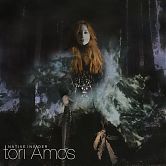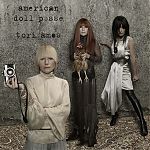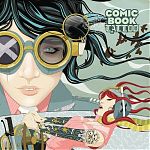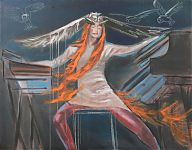- Articles
- Cherries
- Minutiae
- Q&A
- RAINN
- Releases
- Reviews
- Site News
- Them
- Toriphiles
- Touring
- TV/Radio/Web
- Video
News Archives
Keep an eye on our Twitter and Facebook pages since we often post quickie updates there when we're on-the-go.
During tours, we do our best to cover setlists in real-time on Twitter. If you want to tweet a show in, just DM or @ us on the day and tell us to watch your stream that night.
Tori is touring in 2017 to support the release of Native Invader. The European legs runs from early September through early October and the North American leg runs from late October to early December. We do not know if additional dates elsewhere will be added.

Native Invader (album, 2017)

Unrepentant Geraldines (album, 2014)

Gold Dust (album, 2012)

Night of Hunters (album, 2011)

Midwinter Graces (album, 2009)
 Abnormally Attracted To Sin (album, 2009)
Abnormally Attracted To Sin (album, 2009)
Live at Montreux 1991/1992 (DVD, 2008)

American Doll Posse (album, 2007)

A Piano (boxed set, 2006)

Pretty Good Years
(bio, 2006)

Fade To Red
(DVD, 2006)
 Comic Book Tattoo (book, 2008)
Comic Book Tattoo (book, 2008)News: The WILD Magazine Interview (April 2013)

Someone asked me the other day if I could be anyone, who would I be. And I said I would be an advocate in Russia representing the girls in Pussy Riot.
The Bold Issue of The WILD magazine features an interview with Tori by Serena Qiu, with this lovely illustration by Sulamit Elizondo. The conversation, which appears to have taken place sometime towards the end of 2012, begins with Gold Dust but quickly veers to the music industry, Transmission Galactic, RAINN and Pussy Riot.
The full article is online but if you’d like a print copy of the magazine, The WILD can be found in several stores in New York City as well as some other larger cities around the world or you can order a copy directly from them.
Thanks to mkgtweety for the tip!
ALL THE WHITE HORSES
by: SERENA QIU
illustrations by: SULAMIT ELIZONDO
Since her breakout 13 albums 20-plus years ago, Tori Amos has become easily one of the most active artists of our time. As a teenager, Amos traded (though never fully abandoned) her classical piano training for rock and roll, and began performing songs she authored. In the music world, she is variously revered as a fearless vocalist who wrote lyrics as poetic as they were lucid about female identity, who brought new prominence to the piano as a rock instrument, or who helped revitalize singer- songwriter traditions in mainstream music. Humble and grounded with regards to her own accomplishments, Amos lights up in conversation about human rights and social justice. Amos is the co-founder of and a spokesperson for the Rape, Abuse and Incest National Network (or RAINN), now in its eighteenth year and still growing in reach and influence. We had the fortune of speaking to this artist of many legacies about her most recent album, her work as an activist, and the Boldness she admires in others.
In Gold Dust, your most recent album, you revisit a lot of the previous works recorded during your career, and you mentioned [in a press statement] that a lot of things had changed over time, and that these songs have changed your life. What particular changes, since you first wrote these songs, makes you think of them again now?
When I wrote “Winter” I was thinking about a daughter, walking in the snow field with her father, or grandfather, or both at different times. And when I was recording that [this time], the pictures were changing so that I was thinking of my daughter when she was around 2, and this time she had fallen, and her dad picked her up. So she became the image in that.
When I was singing “Winter,” it was with an awareness that, yes, the film of me as a little girl was still there, but there’s another film playing. “Winter” was telling me, as all the songs do, that we’re expanding and we’re not just one perception of who we are.
I’ve been particularly drawn to the covers of your albums. Is there a reason that the cover of Gold Dust takes place in New York?
I found that I wanted to explore the idea of conversation. The conversations that can happen in a day, a day in your life. And how at the time we might not think a whole lot about it—whether it’s in a coffee shop, or passing people on the street, or by the train. But these conversations are conversations that build up into songs, by listening and observing from life…
When I’m listening and observing—the possibilities, the stories! It’s quite something.
In previous interviews, you’ve spoken about overcoming adversity both as a woman in your industry and the world, and as a pianist. What do you think about how things are now? Are there the same challenges, or new challenges facing female artists and piano players in popular music?
Yes, there are different challenges maybe; some have continued. I’d say that twenty years ago, labels were interested in signing artists — as well as performers, vocalists — who then do professional songwriting. These days if you’re an artist writing your own material… I don’t think they’re signing as many now as they were. And the reality TV shows now aren’t really about artists, necessarily. It’s more about being a performer. So the development of artists, and opportunities for development of artists, is challenged. The opportunities aren’t as extensive as they were say, fifteen or twenty years ago.
Another one is, if you think about it, that people seem to be more interested in the next, next thing. This is a reality entering the music business; you have to think about — is this an industry that you see a lot of women growing older and being vital, or being able to have a long career and work? It’s different when you look at the men: Leonard Cohen, Neil Young, and on and on and on. There is an endless amount of them that are still able to have a career. There are much fewer women.
You’re very right. Is that why you decided to start your own label, Transmission Galactic?
I decided to start my own label as a think tank because of development — the idea of development in this day and age. There isn’t necessarily a culture of developing young or new bands, new artists. And sometimes bands and artists do need some of that. Things don’t happen right away, necessarily.
How’s that been going, by the way?
I think we’re learning. And there’s a group of us that makes up Galactic, so it’s the early days for us and we’re learning about it. And that’s ok! It’s not about how fast you understand something.
Shifting gears, this is RAINN’s (Rape, Abuse and Incest National Network) eighteenth year, right? The numbers I have heard are astounding — it’s helped over 1.5 million people through the hotline alone. I remember reading that you’ve introduced a new feature to help people connect to the organization through instant messaging as an alternative to calling. I was wondering if you had new ways in store for reaching out to an even broader network of people and educating them?
I think one issue we’ve had to think about is the armed forces, and abuse within the armed forces. We’ve dedicated a line to deal with just that. And the people at RAINN are aware and happy to be constantly thinking of ways to make the hotline and help available, because a lot of times people will keep it secret and don’t want to expose themselves because of the situation they’re in.
In RAINN’s mission statement you mentioned that you use concerts as a forum to raise awareness in young women and men, and you have musical events and benefits. Are there other ways you have used your music for RAINN’s cause?
Not just the music. I think you get people that come to the shows, and use the hotlines as well, to talk. And it becomes a domino effect where people make it so that people can talk to each other online or share their experiences. I mean, there are all kinds of different developments that have happened over the last 18 years.
Sharing their experiences and their process and what happened really has an effect — when people start talking about their journeys and their continued healing. There is a [misconception] sometimes that you’re going to wake up one day and it’ll be, “Okay, I can close that book now!” You won’t feel that way for maybe several months. Or be alright today, but all of a sudden out of the blue something happens and you find that you’re having to deal with another layer.
So being able to talk about these things with other people who are experiencing them has been — I have heard — a continued benefit to people, especially because RAINN is worldwide, and people can talk to each other and connect worldwide. Even if it’s communicating through email.
Who are some of the people you’ve especially loved working with at RAINN over the years?
There are people on the board who have been very dedicated. Nameless, faceless people that are tireless in their efforts to make sure that it is running as a proper charity and that it is where it needs to be. People that work on that side of it, I have admiration for, and are dealing with it all the time. That’s quite a lot of energy. It needs a certain type of energy to be very grounded with it, and move forward with it, and yet live a day to day life.
You personally are an icon, and people look up to you for your courage and accomplishments as an artist and an activist. So keeping with the theme of our current issue, Bold, is there a bold move you most want to be remembered by?
Do I want to be remembered by, or inspires me?
Hm, either.
Well the women in Russia right now who are being sent to the work camps — the two women from Pussy Riot, that stood up for their beliefs and created a protest, are being made examples of in Russia.
I don’t know if we can really — really — understand how speaking out like that has those kinds of consequences. It’s incredibly scary to think about and it’s a wake-up call, isn’t it, that sometimes we don’t use the opportunity we have in the West to speak up. I don’t mean protest for protests’ sake. I know that sometimes I can get lethargic about speaking out, or doing all the things we can do, like vote — things that we are able to and have freedom to do here. Sometimes we as women don’t use these freedoms. Again, I’m not saying to protest because you can.
There are a few Russian people I’ve been speaking to, Russian journalists, over the last couple of weeks, who were there in Berlin — they would come to the shows and I would speak to them there. They’re refusing to be bullied because of the fear that they could be thrown into prison for speaking, and yet are trying to be intelligent about how, as writers, they write their articles so that they give strength to the masses, and give information, and convey the passion: so, how to get through these very dark times Russia is facing. I have so much respect for the writers in Russia who are facing a time of great censorship, and the threat of being thrown into work camps. I am very inspired by them and the women in Pussy Riot. You wouldn’t imagine these consequences! I mean, it’s insane!
And the fact that Putin has the power to do this, that an oligarch is so afraid of these two women that he has to put them in work camps — and no one even knows which work camps! Someone asked me the other day if I could be anyone, who would I be. And I said I would be an advocate in Russia representing the girls in Pussy Riot.
Maybe that answers this last question, which is the question we always end our interviews with. What is your WILD Wish?
My WILD Wish? I’ve always wished I had a green thumb.
Green thumb?
Yeah. I always wished I could garden.
What would you grow in your garden?
Vegetables.
To cook and eat?
Yeah. You know, it’s when I hear about people who can grow stuff, I think, wow. If I had the time, I would study and really learn. I mean, even then, my mother has told me it’s not that easy. My grandmother had an amazing ability with violets. She could grow flowers. That was her thing. But my mother told me to forget about it. I could study as much as I want but then I would have to figure out that magic that gardeners have.


